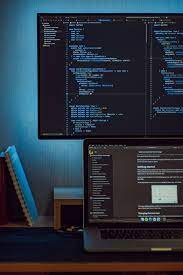The Essential Role of Software Developers in Driving Technological Innovation
The Role of Software Developers in Today’s Digital World
Software developers play a crucial role in shaping the digital landscape of today. Their expertise and creativity drive innovation and enable businesses to thrive in a rapidly evolving technological environment.
Creating Solutions
Software developers are problem solvers at heart. They analyze complex issues, design efficient algorithms, and write code to create software solutions that address specific needs. Whether it’s developing mobile applications, designing web platforms, or optimizing systems for performance, software developers are at the forefront of technological advancement.
Collaboration and Communication
Effective communication and collaboration are essential skills for software developers. They often work in teams with other professionals, such as designers, project managers, and quality assurance testers, to bring projects to life. Clear communication ensures that everyone is aligned on project goals and timelines, leading to successful outcomes.
Continuous Learning
The field of software development is constantly evolving. Developers must stay updated on the latest programming languages, tools, and best practices to remain competitive. Continuous learning is a key aspect of a developer’s career growth, enabling them to adapt to new technologies and trends in the industry.
Problem-Solving Skills
Software developers excel at breaking down complex problems into manageable tasks. They approach challenges with a logical mindset, identify potential solutions, and implement effective strategies to overcome obstacles. Their problem-solving skills are instrumental in delivering high-quality software products that meet user requirements.
Conclusion
In conclusion, software developers are indispensable assets in today’s digital world. Their technical expertise, collaborative spirit, continuous learning mindset, and problem-solving skills drive innovation and propel businesses forward. As technology continues to advance at a rapid pace, the role of software developers remains vital in shaping our digital future.
7 Essential Tips for Software Developers to Stay Sharp and Thrive
- Stay updated with the latest technologies and trends in the industry.
- Practice coding regularly to improve your skills and stay sharp.
- Collaborate with other developers to learn from each other and expand your knowledge.
- Write clean and efficient code for better readability and maintainability.
- Don’t shy away from asking for help when you’re stuck on a problem.
- Take breaks and prioritize work-life balance to avoid burnout.
- Always test your code thoroughly to catch bugs early and ensure quality.
Stay updated with the latest technologies and trends in the industry.
Staying updated with the latest technologies and trends in the software development industry is crucial for software developers to remain competitive and relevant in their field. By keeping abreast of new tools, programming languages, and best practices, developers can enhance their skills, expand their knowledge base, and adapt to the ever-changing demands of the digital landscape. Continuous learning not only empowers developers to tackle complex challenges more effectively but also enables them to contribute innovative solutions that drive progress and success in the fast-paced world of technology.
Practice coding regularly to improve your skills and stay sharp.
To enhance their abilities and maintain a high level of proficiency, software developers should prioritize regular coding practice. Engaging in consistent coding exercises not only hones their skills but also helps them stay sharp and adaptable in the ever-evolving tech landscape. By dedicating time to practice coding regularly, developers can sharpen their problem-solving capabilities, reinforce their understanding of programming concepts, and cultivate a mindset geared towards continuous improvement and innovation.
Collaborate with other developers to learn from each other and expand your knowledge.
Collaborating with other developers is a valuable practice that can significantly enhance your skills and broaden your knowledge in the field of software development. By working together with peers, you have the opportunity to learn from their experiences, gain new perspectives, and discover innovative approaches to solving problems. This collaborative environment fosters creativity and encourages continuous learning, ultimately helping you stay current with industry trends and technologies. Embracing collaboration with other developers can lead to personal growth and professional development, making you a more versatile and well-rounded software developer.
Write clean and efficient code for better readability and maintainability.
When it comes to software development, writing clean and efficient code is paramount for enhancing readability and maintainability. By following best practices and coding standards, developers can ensure that their code is easy to understand for themselves and their colleagues. Clean code not only improves readability but also makes it simpler to troubleshoot issues and add new features in the future. Additionally, efficient code optimizes performance and reduces the likelihood of bugs or errors, ultimately leading to a more robust and sustainable software system.
Don’t shy away from asking for help when you’re stuck on a problem.
When facing a challenging problem as a software developer, it is essential not to hesitate in seeking help. Asking for assistance when you are stuck can provide fresh perspectives, insights, and potential solutions that you may not have considered on your own. Collaboration and learning from others in the field can lead to quicker problem resolution and personal growth as a developer. Embracing the idea of asking for help when needed demonstrates humility and a commitment to continuous improvement in your skills and problem-solving abilities.
Take breaks and prioritize work-life balance to avoid burnout.
Taking breaks and prioritizing work-life balance are essential practices for software developers to prevent burnout. In the fast-paced and demanding field of software development, it’s easy to get caught up in long hours and intense focus on projects. However, stepping away from work, whether it’s for a short walk, a coffee break, or spending time with loved ones, can help recharge the mind and body. By maintaining a healthy balance between work and personal life, developers can sustain their productivity, creativity, and overall well-being in the long run.
Always test your code thoroughly to catch bugs early and ensure quality.
Testing code thoroughly is a crucial practice for software developers to identify and rectify bugs early in the development process, ultimately ensuring the quality and reliability of the software. By conducting comprehensive testing, developers can detect potential issues, improve performance, and enhance user experience. Emphasizing thorough testing not only helps in delivering a robust product but also saves time and resources by addressing issues proactively before they escalate.






